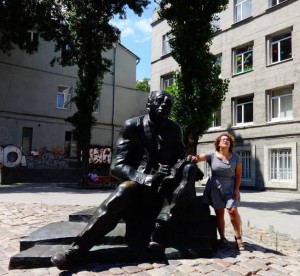
by Talia Lavin
A Personal Lens on the News from Ukraine
On May 2nd the southern Ukrainian city of Odessa saw its first major outbreak of violence since the turmoil in Ukraine began a few months ago. A Ukrainian-unity rally led to clashes between pro-Ukrainian protesters and pro-Russian separatists, and several hours of street violence ensued. The two sides hurled cobblestones, bricks and Molotov cocktails at one another. A raging fire that ignited the city’s Trade Union Building killed 31 people. Bloodied bodies lay in the city center, on Kulikovo Street.
Odessa, which sits on the lip of the Black Sea, has long held a unique place in the hearts and minds of those who inhabit, or study, the Former Soviet Union. From its founding in 1794, the city’s thriving role in commercial trade attracted a cosmopolitan and multiethnic populace. The city became famous, in the nineteenth and early twentieth centuries, for its humor, earthiness, and vibrant commercial endeavors—both legal and illegal. Due to Catherine the Great’s liberal policies towards Jews in the city, Odessa also attracted a massive—and largely secular—Jewish population. Its reputation for secularism led rabbis of the time to state that the fires of hell burned around Odessa. Poetry and prose in Hebrew, Russian and Yiddish shot out from Odessa’s many presses at the start of the 20th century, penned by the likes of Bialik and Babel; dubbed “The Gate to Zion” in the nineteen-teens, the city was a hotbed of Zionist idealism.

The author with a statue of Isaac Babel in Odessa. (Talia Lavin)
I first visited Odessa in the summer of 2011, working as a volunteer tour guide in the city’s cramped but charming Jewish museum. Pursuing the ghosts of literary men I studied and loved, I walked alone through cobbled streets lined with lindens, practiced my fledgling Russian and swam in the Black Sea off Odessa’s shining cliff-lined beaches. Cafes and bars in the central streets were filled at all hours with revelers drinking sweet Crimean wine.
I spent last year living in Kiev on a Fulbright grant, and returned in July. Since, news of the conflict in Ukraine has pinned me to the grim headlines at all hours. Odessa’s conflagration struck an especially heartsick chord: this city of flaneurs, idylls, poems, and its own brand of off-color humor ought, I thought, to be immune from these harsh blows. The violence struck at my sun-drenched memories, at the literary heart of this seaside city, and frightened me into poetry.
Odessa-Mama
I’m thinking about the fire in Odessa.
I’m dreaming about fire licking down the avenues
lined with lindens overlooking the sea.
And Count Richelieu waving
endlessly through flames. And Catherine the Great
outlined in smoke on her pedestal.
And the black-and-orange colors and the blue-and-yellow colors
consumed alike, and their bearers.
This is a city of jokes
told in their own ribald patois
under acacia trees —
Odessity have their own dialect
filled with dirty words homegrown and foreign,
and here Isaac Babel’s
legendary Jewish gangsters were born.
A city I fell in love with; which I loved in;
whose streets change names
again and again but never change cobbles.
Odessa has its own champagne: a lousy
brew, like bread; it leaves
sugar on your lips,
it leaves you wanting.
I’m thinking about those stones- on
Deribasovskaya Street – wrenched loose
and flung at heads and windows,
when better those same cobblestones should warm
feet that walk to the water; smooth as palms,
and silent about all they’ve seen,
and the blue Black Sea brocaded
at its north lip by lime-white cliffs
and willows with ashes in their hair.
Odessa had thought herself
too old for this, and put on airs,
a woman with a smile on her lips,
salt caking her feet.
But the old spirit hungers still,
the old violence, the moons
of bullet marks on the Potemkin steps.
Our new century adorns itself
in pearls of blood.